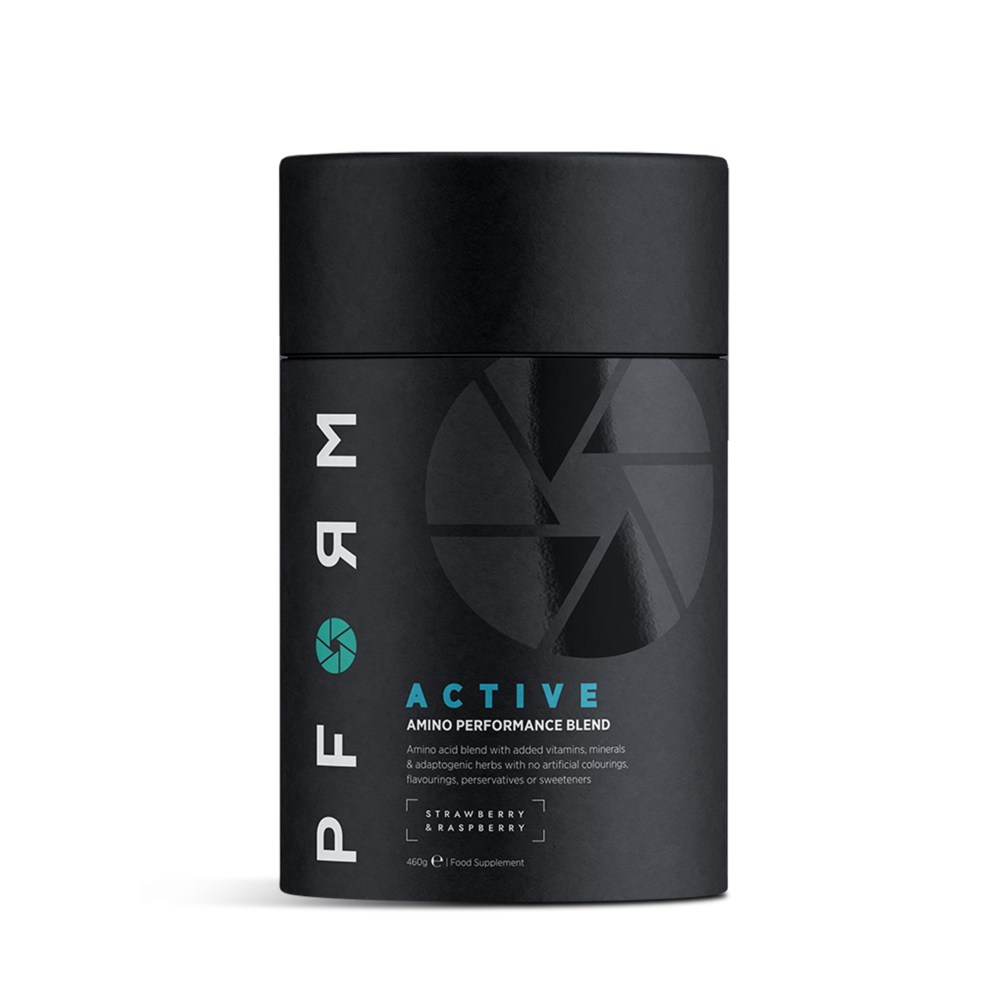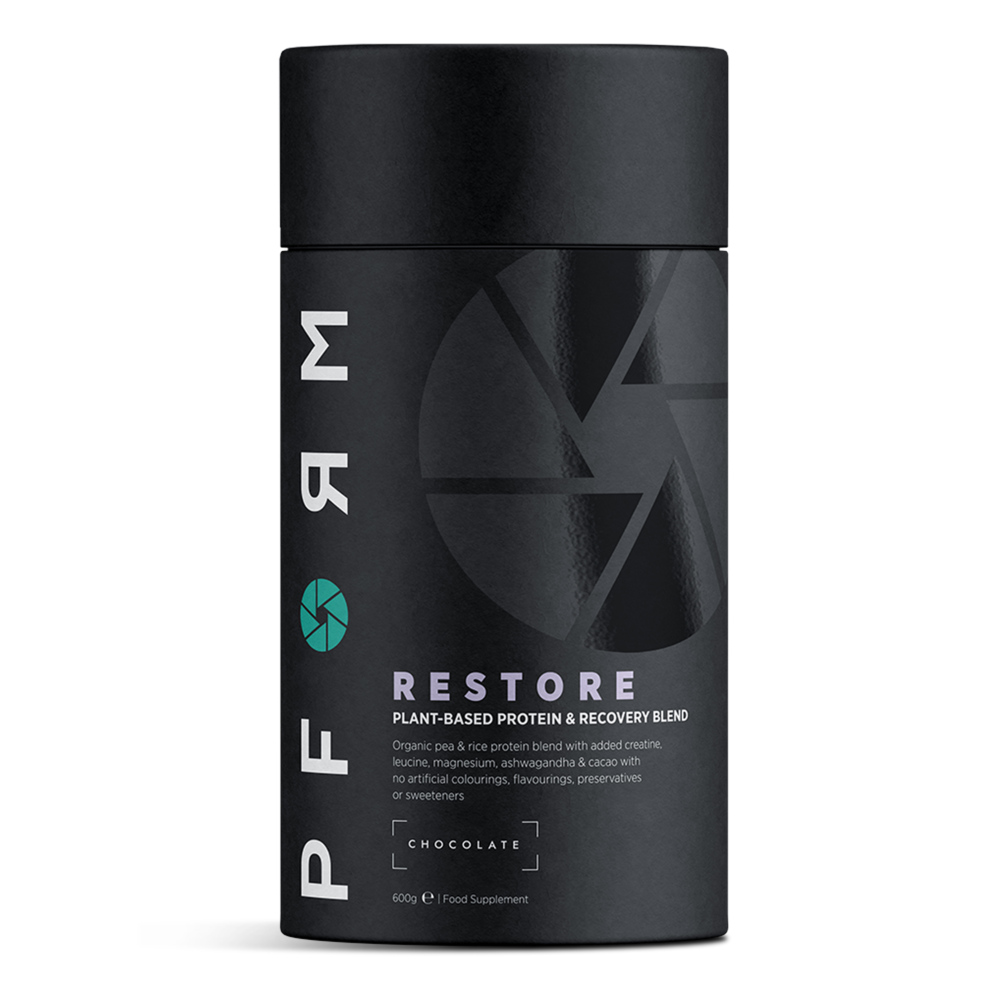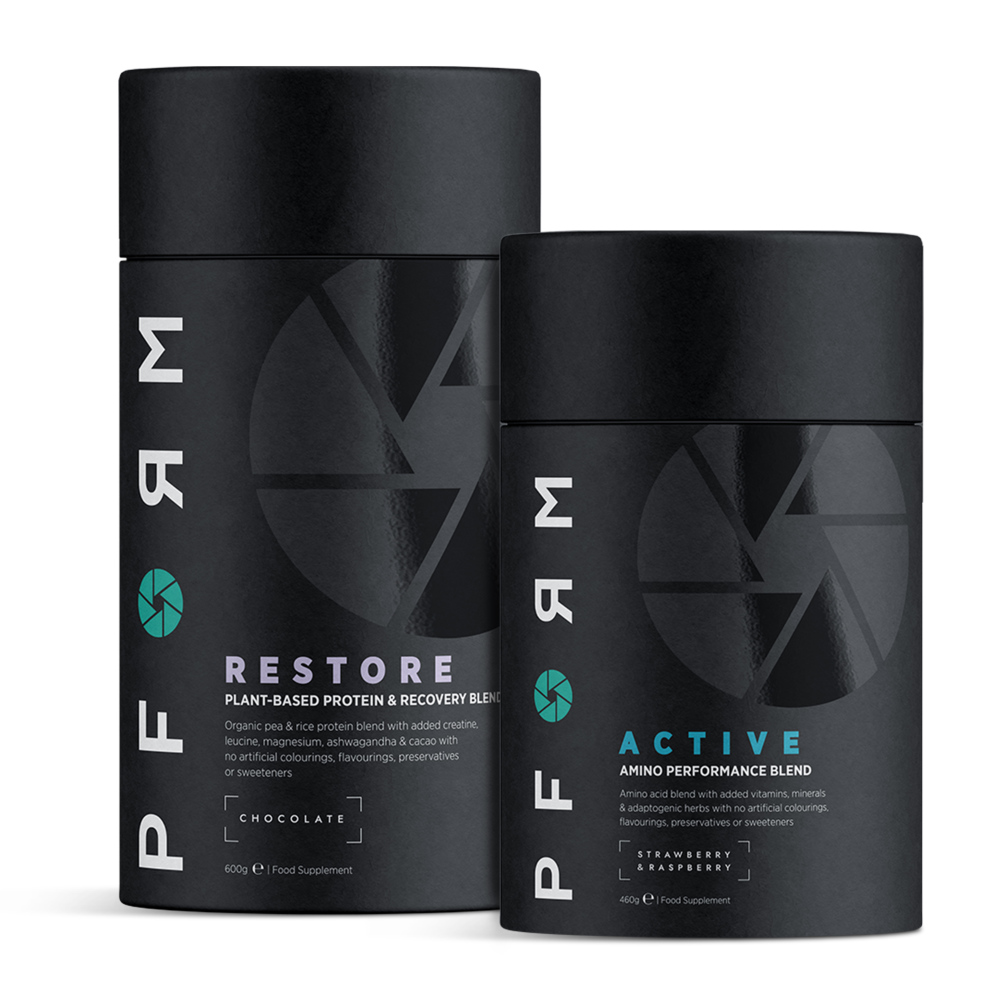
Amino Acids: What are they and how can they support athletic performance?
Amino acids are essential – they are the building blocks of proteins and are necessary for a huge number of different processes that take place in the human body.
This article addresses the two key categories of amino acids, essential amino acids (EAA) and branched chain amino acids (BCAA) – what they are, their functions and what the research says on supplementing with them for athletic advantage.
As we explore the role of different amino acids you will see why we have created PFORM Active, a pre and intra training performance blend.
What are amino acids?
You’ve heard it before, amino acids are the building blocks of proteins. However, this role shouldn’t be understated, since the sequence of amino acids determines the huge variation in the type of protein that is produced, facilitating all of the different structures and functional processes within the human body. The roles of protein vary from energy (ATP) synthesis, to muscle contraction, to formation of connective tissue and the synthesis of brain chemicals (neurotransmitters), and these are just a few. Amino acids are continuously used within all the different biochemical and metabolic reactions that take place.
So, it’s absolutely necessary to meet amino acids requirements in order for the body to be healthy and function and perform optimally. Additionally, for an athlete or someone who trains regularly, their amino acid requirements facilitate recovery, the building of new muscle and support energy.
Amino acids fall into three main groups – essential amino acids (EAAs), non-essential amino acids and conditionally essential amino acids. EAAs cannot be made by the body and therefore must be supplied by the diet, whereas non-essential amino acids can be made by the body. There are also conditionally essential amino acids can theoretically be made by the body but is dependent on the conditions and needs of the body.
Essential Amino Acids (EAAs)
Let’s take a look at the indispensable amino acids known as essential amino acids (EAAs), of which there are nine of: histidine, isoleucine, leucine, lysine, methionine, phenylalanine, threonine, tryptophan, valine.
Supplementation of EAA during exercise may potentially: assist in muscle preservation, especially during a fasted or ketotic state, increase muscle growth in combination with resistance exercise (1), improve the conditions necessary for muscle regeneration (2) and reduce DOMS (delayed onset of muscle soreness) (3).
Let’s briefly assess the roles of the different EAAs.
Histidine
Histidine is the precursor to histamine which plays a key role in the immune system. However, histamine also plays a role in regulating muscle circulation during exercise (3). Histidine is also used for the synthesis of a substance called carnosine which is shown to decrease fatigue during high intensity exercise (4). Histidine has antioxidant properties (3) which may enhance health, recovery and performance.
Isoleucine
Isoleucine is a BCAA. BCAA are known for their integral role in muscle protein synthesis, muscle growth, tissue repair and potentially reducing muscle protein breakdown – their benefits are detailed further below in this article. Isoleucine may be stronger in its ability to cause muscle protein synthesis than valine (the other BCAA) but weaker than leucine (the most potent BCAA).
Experimental evidence indicates that isoleucine plays a role in increasing glucose uptake into skeletal muscle and within maintaining a healthy immune system (6,7,8).
Leucine
Leucine is the BCAA which most potently activates the muscle protein synthesis pathway and is therefore understood to be critical in muscle building.
Leucine plays a role in facilitating glucose uptake into muscle cells (9), insulin secretion (10) and assisting with a strong immune response (11).
Let’s dive into the leucine research for the athlete:
Muscle building
Leucine activates the muscle protein synthesis pathway by activating a protein (called mTOR – mammalian target of rapamycin) which is critical in the muscle protein synthesis pathway (12,13). Supplementation of EAA with additional leucine results in greater activation of the muscle protein synthesis process than EAA alone and therefore may benefit muscle building (14).
There is evidence in older populations that leucine supplementation may result in greater gains of lean muscle mass (15,16) and retention of lean muscle mass during weight loss (17).
Optimal timing of leucine intake is inconclusive – some studies indicate it to be more effective for increasing protein synthesis pre workout (18) whereas others indicate it to be more effective post training (19).
The effects of leucine are not restricted to resistance training either, when comparing consumption of EAA with and without extra leucine during endurance training, the group that took additional leucine saw a much greater effect in muscle protein synthesis (20).
Enhanced performance
In combination with resistance training, muscle growth from leucine supplementation may translate into enhanced strength performance (21). Additionally, endurance performance may significantly improve with six weeks leucine supplementation (22).
Enhanced recovery
The promotion of muscle protein synthesis may enhance muscular recovery when taken following exercise (23).
Prevent muscle breakdown
Experimental evidence indicates that leucine supplementation may reduce muscle wasting in certain health conditions (24).
Lysine
Lysine is required for muscle growth and tissue repair and supplementation may promote healthy tissue function, growth and healing, whilst also improving the immune system. It is essential for collagen formation, healthy connective tissue maintenance and may be beneficial for wound healing.
As well as promoting calcium uptake, lysine is essential for carnitine production and therefore plays an important role in the production of energy from fats. (25).
Methionine
Methionine contains sulphur and is utilised for the production of the body’s most abundant antioxidant, glutathione (26) – so methionine is important for maintaining a healthy immune system.
Methionine plays an important role in energy production due to its role in producing the amino acid creatine which plays an important role in energy metabolism and muscle building (27).
Phenylalanine
Phenylalanine is utilised to produce other amino acids, such as tyrosine (28), critical in the production of certain brain chemicals such as epinephrine, norepinephrine and dopamine (29) and may have pain reducing and mood enhancing effects (29,30).
Threonine
The main role of threonine is to maintain protein balance. Threonine is necessary for the formation of collagen and elastin and therefore necessary for healthy functioning connective tissue – ligaments and tendons.
Threonine also contributes to a healthy immune system and central nervous system.
Tryptophan
Tryptophan is the precursor for the brain chemical serotonin, which is known to suppress pain (31). Tryptophan may theoretically therefore increase tolerance to pain during hard workouts. Tryptophan is also involved in various other processes within the body, such as energy metabolism and vitamin B3 production (31).
Valine
Valine is the final BCAA to be mentioned and is therefore also known for its role in activating the muscle protein synthesis pathway (the mTOR protein) (32).
Experimental evidence indicates that valine may support glycogen maintenance and reduce fatigue (33).
Branched Chain Amino Acids – BCAAs
Three of the EAA, leucine, isoleucine and valine, are called branched chain amino acids (BCAA) – due to their similarly structured sidechain. BCAA are especially important in the process of maintaining, building and repairing muscle and supplementation of BCAA may mitigate the damage induced by exercise, enhance muscle protein synthesis and improve muscle protein recovery.
BCAA and especially leucine activates the process of muscle protein synthesis mainly through activation of a factor called mTOR (mammalian target of rapamycin) which is critical in muscle protein synthesis. (34,35)
As well as enhancing muscle protein synthesis and repair, BCAA assist with the growth and health of the powerhouse of the cell – the mitochondria – during exercise and may prevent central fatigue.
Benefits of BCAA
Prevent central fatigue
Elevated levels of the brain chemical serotonin are an understood contributor to central nervous fatigue during exercise (36). BCAA may compete with the substance necessary to make serotonin (tryptophan), reducing its transport across the blood-brain barrier and preventing central fatigue during prolonged exercise (36). Indeed, supplementation of BCAA is shown to improve levels of central fatigue (37).
Reduced muscle breakdown
Exercise induces muscular damage and the breakdown of muscle. BCAA supplementation before and during exercise suppresses the breakdown of muscle protein during exercise (38). BCAA may assist with effects of exercise such as muscular damage and the production of substances known as reactive oxygen species (38).
Reduced muscle damage and soreness
Supplementation of BCAA may reduce muscular damage and soreness (39,40,41,42). It may be more beneficial when taken prior to exercise (39,40) although the impact of supplement timing isn’t conclusive (43).
Supplementation of BCAA at a 2:1:1 ratio of leucine, isoleucine and valine may increase the rate of recovery from resistance training exercise and perceived muscle soreness (44).
Supplementation of BCAA may also be especially effective for reducing exercise induced DOMS and muscular damage when combined with other amino acids such as taurine (45) and other EAAs (46).
Promote muscle protein synthesis
BCAA, in particular leucine, activates the key signal for muscle protein synthesis, mTOR (47,48). Supplementation of EAA enriched with leucine following resistance exercise enhances the activation of muscle protein synthesis (35,43).
Better performance
Supplementing with BCAA may improve lactate threshold and endurance capacity (49). Performance may be improved by reduced central fatigue and improved reaction times (37,50). Also, consumption of a BCAA supplement prior to high intensity training may reduce ratings of perceived exertion which may contribute to improved performance (51).
Improved muscle tissue repair
BCAA especially leucine may promote repair of muscle by decreasing the breakdown of muscle protein (52).
High doses of BCAA can result in depletion of vitamin B6, so it is typically important to ensure you are supporting B6 levels when supplementing with BCAAs. Your preferred B6 form should be that of P-5-P which is the active form of vitamin B6.
Take Home Points
EAAs and BCAAs are essential for health, performance and recovery: they are the building blocks for a functioning body and adequate amounts are essential to be healthy and ensure optimal recovery and performance.
Supplementation of EAAs and BCAAs may enhance recovery and performance: adequate levels of amino acid, inclusive of BCAA, especially leucine is critical in the muscle protein synthesis pathway and therefore necessary components of muscle repair, regeneration and muscle mass building.
When supplementing consider all ingredients and ratios: watch out for unwanted added ingredients such as artificial sweeteners and anything else you don’t want, go for a mix of EAAs and BCAA and use an amino acid ratio for BCAA of 2:1:1 (leucine, isoleucine, valine).
Related Products
References
- Tipton et al. (1999). Postexercise net protein synthesis in human muscle from orally administered amino acids.
- Reidy et al. (2017). Postexercise essential amino acid supplementation amplifies skeletal muscle satellite cell proliferation in older men 24 hours postexercise.
- Nosaka et al. (2006). Effects of amino acid supplementation on muscle soreness and damage.
- Holecek (2020). Histidine in health and disease: metabolism, physiological importance and use as a supplement.
- Hill et al. (2007). Influence of beta-alanine supplementation on skeletal muscle carnosine concentrations and high intensity cycling capacity.
- Doi et al. (2005). Isoleucine, a blood glucose-lowering amino acid increases glucose uptake in rat skeletal muscle in the absence of increases in AMP-activated protein kinase activity.
- Doi et al. (2003). Isoleucine, a potent plasma glucose-lowering amino acid, stimulates glucose uptake in c2c12 myotubes.
- Fehlbaum et al. (2000). An essential amino acid induces epithelial beta-defensin expression.
- Nishitani et al. (2002). Leucine promotes glucose uptake in skeletal muscles of rats.
- Yang et al. (2012). Leucine stimulates insulin secretion via down-regulation of surface expression of adrenergic α2A receptor through the mTOR (mammalian target of rapamycin) pathway: implication in new-onset diabetes in renal transplantation.
- Ananieva et al. (2016). Leucine metabolism in T cell Activation: mTOR signalling and beyond.
- Duan et al. (2015). Nutritional and regulatory roles of leucine in muscle growth and fat reduction.
- Dreyer et al. (2008). Leucine enriched essential amino acid and carbohydrate ingestion following resistance exercise enhances mTOR signalling and protein synthesis.
- Glynn et al. (2010). Excess leucine intake enhances muscle anabolic signalling but net protein anabolism in young men and women.
- Komar et al. (2015). Effects of leucine-rich protein supplements on anthropometric parameter and muscle strength in the elderly: a systematic review and meta-analysis.
- Zu et al. (2015). The effectiveness of leucine on muscle protein synthesis, lean body mass accretion in older people: a systematic review and meta-analysis.
- Verreijen et al. (2015). A high whey protein, leucine, and vitamin D enriched supplement prserves muscle mass during intentional weight loss in obese older adults: a double-blind randomised controlled trial.
- Tipton et al. (2001). Timing of amino acid carbohydrate ingestion alters anabolic response of muscle to resistance exercise.
- Moore et al. (2009). Ingested protein dose response of muscle and albumin protein synthesis after resistance exercise in young men.
- Pasiakso et al. (2011). Leucine-enriched essential amino acid supplementation during moderate steady state exercise enhances postexercise muscle protein synthesis.
- Ispoglou et al. (2011). Daily L-leucine supplementation in novice trainees during a 12- week weight training program.
- Crowe et al. (2006). Effects of dietary leucine supplementation on exercise performance.
- Anthony et al. (1999). Leucine supplementation enhances skeletal muscle recovery in rats following exercise.
- Peters et al. (2011). Dose-dependent effects of leucine supplementation on preservation of muscle mass in cancer cachectic mice.
- National centre for biotechnology information (2020). PubChem compound summary for CID 5962, Lysine.
- Nimni et al. (2007). Are we getting enough sulphur in our diet?
- Martinez et al. (2017). The role of methionine on metabolism, oxidative stress, and diseases.
- Matthews (2007). An overview of phenylalanine and tyrosine kinetics in humans.
- Kapalka (2010). Phenylalanine and phenylethylamine.
- Russell et al. (2000). DL-phenylalanine markedly potentiates opiate analgesia – an example of nutrient/pharmaceutical up-regulation of the endogenous analgesia system.
- Richard et al. (2009). L-tryptophan: basic metabolic functions, behavioural research and therapeutic indications.
- Carunchio et al. (2010). Increased levels of p70S6 phosphorylation in the G93A mouse model of Amyotrophic lateral sclerosis and in valine-exposed cortical neurons in culture.
- Tsuda et al. (2018). Acute supplementation of valine reduces fatigue during swimming exercise in rats.
- Norton et al. (2006). Leucine regulates translation initiation of protein synthesis in skeletal muscle after exercise.
- Dreyer et al. (2008). Leucine enriched essential amino acid and carbohydrate ingestion following resistance exercise enhances mtor signalling and protein synthesis in human muscle.
- Cheng et al. (2016). The supplementation of branched-chain amino acids, arginine and citrulline improves endurance exercise performance in two consecutive days.
- Mikulski et al. (2015). Effects of supplementation with branched chain amino acids and ornithine aspartate on plasma ammonia and central fatigue during exercise in healthy men.
- MacLean et al. (1994). Branched-chain amino acids augment ammonia metabolism while attenuating protein breakdown during exercise.
- Foure et al. (2017). Is branched-chain amino acids supplementation an efficient nutritional strategy to alleviate skeletal muscle damage? A systematic review.
- Ra et al. (2017). Effect of BCAA supplement timing on exercise-induced muscle soreness and damage: a pilot placebo-controlled double-blind study.
- Fedewa et al. (2019). Effect of branched-chain amino acid supplementation on muscle soreness following exercise: a meta-analysis.
- VanDusseldrop et al. (2018). Effect if branched-chain amino acid supplementation on recovery following acute eccentric exercise.
- Salinas-Garcia et al. (2014). Effects of branched amino acids in endurance sports: a review.
- Waldron et al. (2017). The effects of acute branched chain amino acid supplementation on recovery from a single bout of hypertrophy exercise in resistance-trained athletes.
- Ra et al. (2013). Combined effects of branched-chain amino acids and taurine supplementation on delayed onset muscle soreness and muscle damage in high-intensity eccentric exercise
- Nosaka et al. (2006). Effects of amino acid supplementation on muscle soreness and damage.
- Blomstrand et al. (2006). Branched chain amino acids activate key enzymes in protein synthesis after physical exercise.
- Kimball et al. (2006). Signalling pathways and molecular mechanisms through which branched-chain amino acids mediate translational control of protein synthesis.
- Matsumoto et al. (2009). Branched-chain amino acid supplementation increases the lactate threshold during an incremental exercise test in trained individuals.
- Blomstrand (2006). A role for branched=chain amino acids in reducing central fatigue.
- Gervasi et al. (2020). Effects of a commercially available branched-chain amino acid-alanine-carbohydrate-based sports supplement on perceived exertion and performance in high intensity endurance cycling tests.
- Nair et al. (1992). Leucine as a regulator of whole body and skeletal muscle protein metabolism in humans.



















